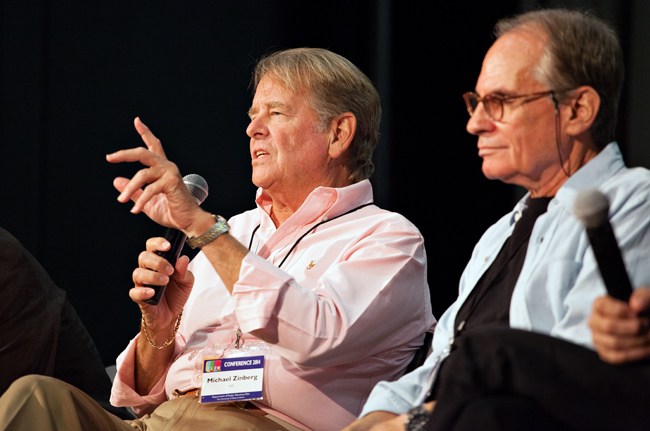In a crowded room in the Student Activity Center on Thursday, a panel of writers, directors and a television critic discussed the history of television from the 1970s through today.
Three panel guests spoke from their own experiences in the television and film industry as part of the first day of the Flow Conference 2014, which was organized by radio-television-film graduate students.
David Milch, director, writer and producer responsible for the shows “Deadwood” and “NYPD Blue,” said it takes a specific type of person to work in the television industry.
“Television is pervasive, and demands are insatiable,” Milch said. “It takes certain personalities to succeed.”
Horace Newcomb, a former UT professor and emeritus director of The Peabody Awards, moderated the event. To begin, Newcomb asked each of the guests about why they entered the television industry.
“I think the television industry was a good way [for me] to be a storyteller,” said Michael Zinberg, director and producer of the shows “The Good Wife,” “Quantum Leap” and “The Bob Newhart Show.” “Things around television have changed over the years, but storytelling hasn’t changed.”
Howard Rosenberg, retired television critic for the Los Angeles Times and winner of the Pulitzer Prize for Criticism, said he excelled in the industry because of the people who surrounded him.
“Most of what I was writing was bad,” Rosenberg said. “But, at that time, most people writing about television were old people writing network press releases. It was hard not to be noticed.”
Newcomb asked the panelists how they think the industry has changed in the last 40 years. Rosenberg said Tony Soprano, a character from the television drama series “The Sopranos,” demonstrates the type of character whom audiences have come to favor.
“We see a glut of antiheroes,” Rosenberg said. “If we still had Mr. Rogers, maybe he would be assaulting the neighborhood kids.”
The panelists talked about the shortcomings of the television industry, starting with the problems of a corporation-
dominated industry.
“A lot of the [network executives] think that they know what the graveyard is littered with,” Zinberg said.
Zinberg said CBS argued with him about the addition of a homosexual character to one of his shows. In retaliation, Zinberg took the idea to a homosexual rights group that threatened to boycott CBS.
The Flow Conference 2014 will continue through Saturday, and is free to students, staff and faculty.




















